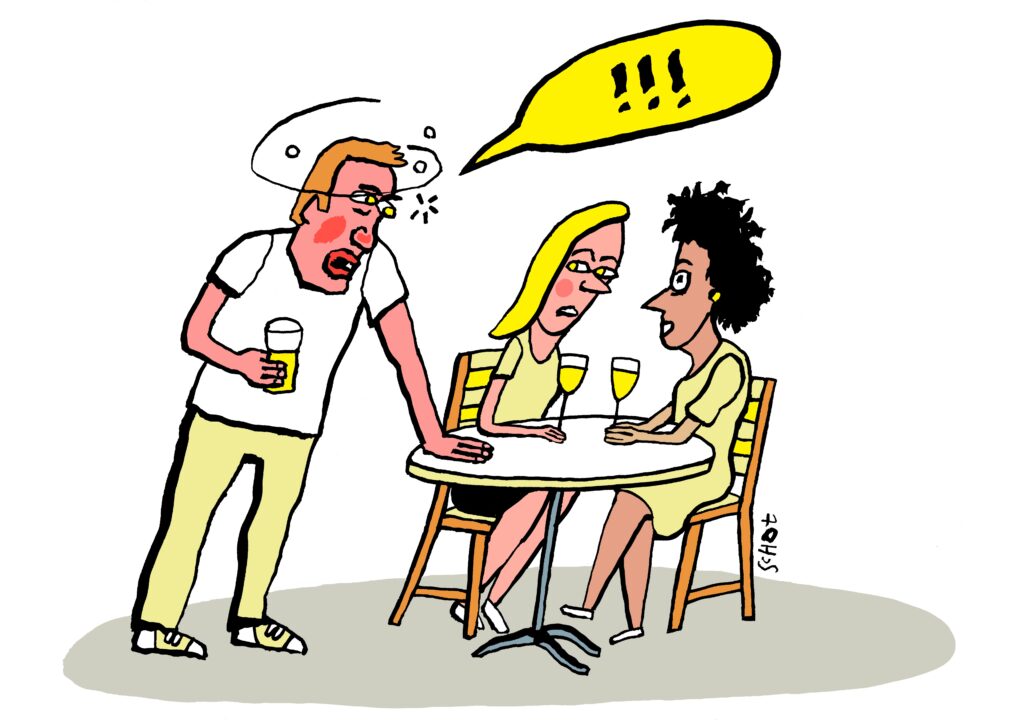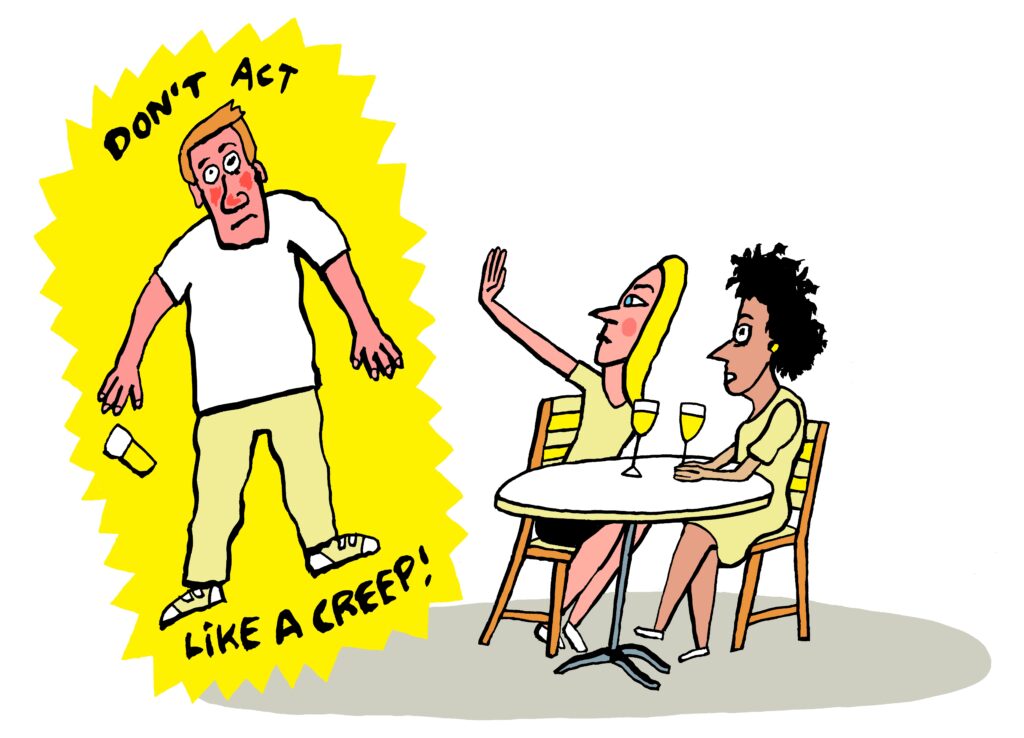Hey, hot babe! Don’t be such a whiner, I’m giving you a compliment
When is a comment like ‘hot babe’ a compliment, and when does it cross the line? What seems innocent takes on a completely different meaning depending on who says it, how, and when, says Univers editor Anne Grefkens: ‘Sometimes I enjoy it when someone calls me ‘hot babe’.‘

‘Isn’t it just a compliment when I say ‘hot babe’,’ says the man standing next to me. Five minutes earlier, he had come to the table uninvited, interrupting a conversation between a friend and me. I can hardly ignore the smell of beer wafting from his mouth. With every word he utters, he seems to be scooting his stool closer to us. Even though we’re not looking forward to a conversation, he effortlessly manages to avoid our bored glances.
Still, I decide not to interrupt him. Sometimes it’s easier (read: better for your own mood) not to point out every man’s rude behavior. Because let’s face it: if I had to respond to every nasty online comment, sexist remark at a birthday party, or unsolicited whistle in the street, I’d have a full-time job. And, to be clear, that’s unpaid.
So I slowly swirl my wine in the glass and bite my tongue in the meantime. But after five minutes – partly thanks to the comment that he ‘prefers to fuck without a condom’ – the limit is reached.
‘If you don’t mind, I’d rather continue this conversation without you,’ I say calmly but firmly. As if stung by a wasp, the man looks at us defeated, a confused look in his eyes: this was supposed to be a pleasant conversation, wasn’t it?
Crossing a border?
‘Was this an attempt at flirting, or was he trying to intimidate us?’ I ask my friend after the man finally left our table. ‘What surprises me most is how naturally he finds such language,’ she replies. ‘As if ‘hot babe’ is something to be thankful for.’
With that, she hits the figurative nail on the head. In his eyes, the man had merely given a compliment. And that, in his logic, includes a smile or a ’thank you.’ Not a request to leave the table.
But when is a ‘compliment’ a real compliment? Who decides that, anyway? And are we ‘not even allowed to flirt anymore?’
To speak is to do
That same evening, on my bike ride home, the incident kept running through my mind. Why do I find the words ‘hot babe’ uttered by the unknown man so inappropriate? And why isn’t that always the case? In fact, sometimes I actually quite enjoy being called that. Like when a former fling whispered softly in my ear, ‘You’re a hot babe,’ which nearly made me jump with joy.
This question reminds me of the Speech Act Theory of the British philosopher J.L. Austin. According to him, language isn’t simply about conveying information: speaking is about doing.
Austin distinguishes three layers of language use: the locutionary act (what is literally said), the illocutionary act (the intention behind it), and the perlocutionary act (the effect on the listener). The words ‘sexy chick’ are identical in both situations; that’s the locution. But the intention and the effect? They’re as different as night and day.

Context
Consider the situation on a terrace: my friend and I are sitting alone at a table, engrossed in our conversation. A stranger, clearly drunk, suddenly interrupts us. For no reason, he utters the words ‘hot babe.’ Is it a crude flirtation or – at best – an awkward way to get attention? Either way, we feel uneasy.
This is in stark contrast to an intimate situation with your partner. He calls you ‘hot babe,’ but this time it sounds playful and familiar. Within this relationship context, the words are meant as a sincere and playful compliment. The effect? You feel desired and sexy.
No brainer
Yes, it may sound like a no brainer. Of course it matters who says what, when, and how. You might be thinking: I’m not saying anything new here. Yet it’s important to keep highlighting the context. Especially when it’s repeatedly ignored in practice by the coffee machine, during Friday drinks, in the football clubhouse, or on the terrace.
There it is not often philosophical precision that reigns, but different rules apply: whoever makes a sexist joke immediately shouts afterward that ‘it was just a joke’ and whoever says ‘hot babe’ supposedly means it as a compliment.
This consistently elevates the speaker’s intention to a sacred status, while the effect on the listener is casually brushed aside. That’s precisely why we need to keep hammering on that obvious point – over and over – until no one can casually walk past it anymore.
Are we still allowed to flirt?
So, are we still allowed to flirt with complete strangers on a terrace? Absolutely, breathe easy. Romance hasn’t been declared dead by philosophy just yet. Flirting is perfectly fine, as long as your illocutionary intentions don’t sound suspiciously like territorial behavior.
Thanks to Austin’s theory, we understand when flirting feels like a fun game and when it suddenly turns into an awkward episode of ‘Help, my terrace mate is a creep.’
A friendly compliment? Fine. An innocent remark like ‘nice place, isn’t it?’ or the classic ‘Is that wine good?’ Perfect. And if you’d like to join someone at their table, but after a few drinks, find it difficult to gauge whether ‘you’re welcome,’ then pay attention to the reaction your flirting move elicits from them.
Does it remain silent? Does your conversation partner keep moving their chair further away from you? Or does they indicate they’re not interested? Then cut your losses and leave them alone.
On the other hand, do you get a smile in return? Does she also keep making eye contact and constantly asking friendly questions? Then you can ask if you can join her. With a bit of luck, in a few weeks, you’ll be whispering ‘hot babe’ in her ear in an intimate setting.
This article assumes specific genders in certain situations. Univers recognizes that these experiences can also be experienced in reverse or differently. The chosen perspective reflects the author’s personal perspective and is not intended to exclude or dismiss other experiences.






